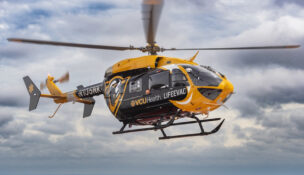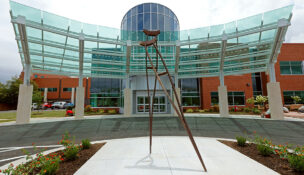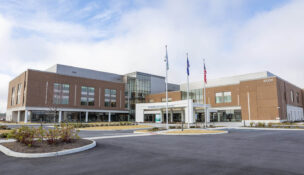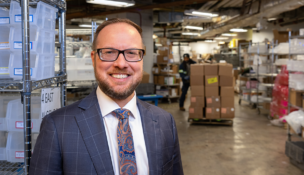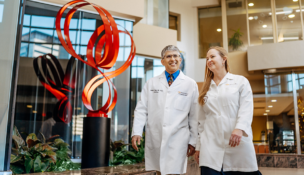Preparing for Ebola
Hospitals across Virginia say they’re spending big to be ready for the worst
Virginia Business //December 30, 2014//
Preparing for Ebola
Hospitals across Virginia say they’re spending big to be ready for the worst
Virginia Business //December 30, 2014//
With the successful treatment in the U.S. of almost a dozen patients infected with Ebola virus disease, much of the public’s anxiety surrounding the October death of the nation’s first victim — Liberian native Thomas Eric Duncan at Texas Presbyterian Hospital in Dallas — has subsided.
Even so, hospitals across Virginia remain vigilant, especially given the potential sky-high costs they expect to pay while treating any patient who tests positive for Ebola.
Based on autopsies and financial reports from the University of Nebraska and Emory University, whose hospitals together have treated a handful of Ebola patients, Virginia hospitals expect treatment of future patients with the disease may cost from $500,000 to $1 million apiece.
That includes the cost of three to four weeks of round-the-clock nursing care, experimental medications and intensive supportive care (including mechanical ventilation, dialysis and fluid replenishment therapy), as well as careful waste disposal.
To illustrate just how serious local hospitals are taking their preparations, Richmond-based Bon Secours Virginia Health System spent “between half-a-million and $1 million in October,” at its facilities in Richmond and Tidewater on staff safety training, equipment purchases and physical plant upgrades, says Dr. William M. Lennarz, one of the senior medical officials in charge of the company’s Ebola preparedness program.
Genemarie McGee, vice president and chief nursing officer at Norfolk-based Sentara Healthcare, couldn’t cite an exact figure for its ongoing expenses statewide for education, training and additional preparations, saying only, “we have spent a tremendous amount of money.”
Sean Connaughton, president and chief executive of the Virginia Hospital and Healthcare Association (VHHA), says Virginia has been identified as a state with a high likelihood to one day get an Ebola patient.
“We have both international airports and international seaports,” he explains. “You have a very substantial West African community. On top of that, you have an enormous number of government and private individuals who travel to places where Ebola is prevalent.”
He says Virginia hospitals are spending out-of-pocket to get ready for their first Ebola patients, and none have hesitated doing so.
In an early November news release, Connaughton called for more funding for hospitals from the state and federal governments. Later that month, Gov. Terry McAuliffe announced the availability of $2 million in state funds for any unexpected costs not covered by existing insurance policies that state agencies — not hospitals — might incur to protect public health in the event Virginia must treat a patient with a confirmed case of Ebola.
With no state money to count on, Connaughton and the VHHA’s 35 member health systems called upon Virginia’s congressional delegation to support the American Hospital Association’s appeal for $500 million from Congress to help health-care companies with the additional costs of treating Ebola patients while maintaining high standards of care for non-Ebola patients.
That lobbying effort succeeded. Last month, as part of its most recent budget, Congress approved more than $5 billion of the $6 billion requested by the Obama administration to help West African nations fight Ebola at its source and to aid U.S. hospitals in preparing to treat possible cases. Included in this total was $500 million earmarked for U.S. hospitals
History of preparedness
Officials at the VHHA and the Virginia Department of Health (VDH) say hospitals across the state began planning their collaborative response to possible public health emergencies in 2002.
After the 9/11 attacks the year before, the federal government organized the Hospital Preparedness Program (HPP) to protect against natural disasters like hurricanes and earthquakes and possible terrorist attacks from miniature nuclear “dirty” bombs or biological weapons containing contagions like anthrax or smallpox.
Under the program, Virginia hospitals share about $4 million annually, according to Connaughton.
So, when Ebola began to run rampant in West Africa last summer and the United States was forced to treat its first patient in late September, Virginia health officials — already preparing for possible cases of Middle East Respiratory Syndrome (MERS) and Severe Acute Respiratory Syndrome (SARS) — added the virus to the list of diseases hospitals had to be ready to handle.
“What we’re doing for Ebola actually builds on the backbone of the HPP. It adds to what has been going on for the last 10-11 years,” says Morris Reece, a technical adviser with the VHHA. “A lot of the Ebola protocols are being built upon the protocols we already have in place.”
One example of Virginia’s HPP in action played out recently in Northern Virginia. On Oct. 17, responding to a call to the Pentagon, an EMS team from the Arlington Fire Department (AFD) was told by a woman who had an elevated body temperature and had vomited in the parking lot that she had recently traveled from Sierra Leone, a nation battling a massive outbreak of the disease. Suspecting it was treating a possible case of Ebola, the AFD crew brought her to nearby Virginia Hospital Center.
The woman was refused admission to the hospital emergency room because the hospital had not yet completed preparation of its Ebola isolation unit, according to a statement released by the hospital.
Instead, the patient was sent to Inova Fairfax Hospital, which had its isolation unit ready. Shortly thereafter, it was determined that the woman had never traveled to West Africa (in fact had never left the U.S.) and was not infected with the virus.
Overall, the VDH is impressed with the seriousness of the way Virginia’s hospitals have worked in an interconnected, emergency preparedness network.
“Our hospitals have been good partners from the beginning. And it’s not just in the last few months or so. It goes back to August when it became clear the outbreak in West Africa was of major concern,” says Dr. David Trump, the VDH’s chief deputy for public health and preparedness.
“We’ve been working with our hospitals and our physicians from that point on to make sure they were aware of the risk of illness of travelers returning from those countries. What’s happened more recently is much more focused efforts.
“It’s a collective effort. They are health-care organizations. They want to provide good care to their patients and their health-care workers … Ebola is something that has to be taken seriously, and they have.”
Virginia’s tiered treatment plan by Tim Loughran



